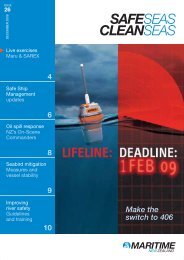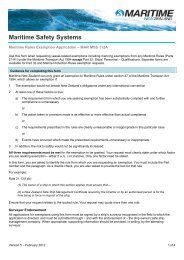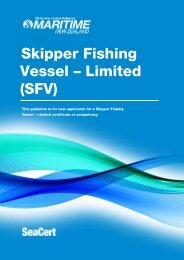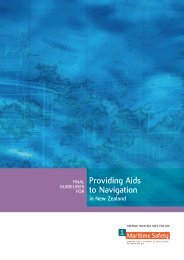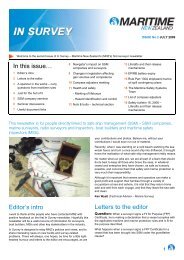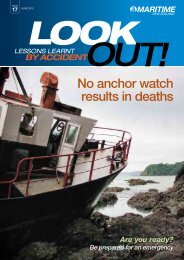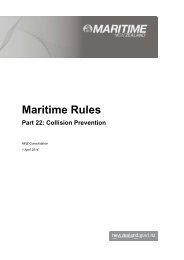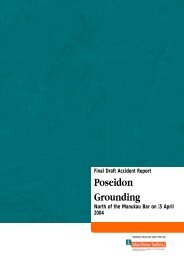Lookout! - Maritime New Zealand
Lookout! - Maritime New Zealand
Lookout! - Maritime New Zealand
Create successful ePaper yourself
Turn your PDF publications into a flip-book with our unique Google optimized e-Paper software.
MANAGE YOUR SLEEP<br />
ff<br />
Take a nap<br />
Napping can help when you are short of sleep.<br />
Understanding how naps work will help you get<br />
the most out of them. About every 90 minutes<br />
during sleep, you cycle through lighter sleep,<br />
deeper sleep and dreaming. Waking from deep<br />
sleep leaves you groggy (sleep inertia). To<br />
minimise this effect, allow yourself either 30–40<br />
minutes, or about 2 hours, or about 3.5 hours<br />
for a nap. A cellphone or alarm clock can be<br />
used to manage the time. The best napping<br />
times are mid-afternoon and after 9pm.<br />
>> MANAGEMENT ACTION POINT<br />
Your expectations determine what seafarers<br />
can do. Let your seafarers know when napping<br />
is and is not okay.<br />
>> SEAFARERS’ ACTION POINT<br />
Plan your naps and take them.<br />
ff<br />
Create a good sleep<br />
environment<br />
Where you sleep at work or home affects the<br />
quality of your sleep. To ensure the best-quality<br />
sleep, try:<br />
• blocking out light or wearing an eye mask<br />
• blocking out noise, wearing ear plugs or using<br />
white noise (a radio tuned off-station or a fan)<br />
• asking for something better if your bed is<br />
uncomfortable<br />
• keeping your sleep area cool<br />
• turning off alarms and phones and letting<br />
people know not to disturb you.<br />
>> ACTION POINT FOR ALL<br />
Get the crew together and brainstorm how to<br />
create a better sleeping environment on the boat.<br />
• avoid caffeine 4 hours before bed<br />
• avoid heavy exercise before bed.<br />
ff<br />
Manage your shiftwork<br />
People vary in how they respond to shiftwork.<br />
Some go to sleep easily after a shift, others<br />
don’t. Our body clocks are cued to daylight<br />
and daily activities, so most people struggle<br />
to adjust to shiftwork and will generally sleep<br />
2–3 hours less a night.<br />
The following may help:<br />
• nap during night shift if possible (discuss<br />
with your employer)<br />
• during a night shift, light food is better than<br />
heavy food<br />
• in the middle of the night avoid dangerous<br />
and complex tasks where possible<br />
• social interaction and light exercise help you<br />
stay alert if your environment is not stimulating<br />
• after finishing night work, try to sleep as<br />
soon as possible<br />
• if you are driving in early morning sunlight,<br />
wear dark glasses.<br />
ff<br />
Plan your time for sleeping<br />
at home<br />
Balancing family, friends, commuting and<br />
working with your need to sleep can be difficult.<br />
>> SEAFARERS’ ACTION POINT<br />
Hold a family conference to work out how to ensure<br />
you get enough sleep so you are fit for work.<br />
MANAGE YOUR FATIGUE<br />
ff<br />
Know your legal obligations<br />
Under the Health and Safety in Employment<br />
Act 1992, fatigue is identified as a hazard that<br />
must be managed. Crew, including people who<br />
are self-employed, must take all practical steps<br />
to ensure that nothing they do at work harms<br />
themselves or any other person.<br />
Employers and skippers must take all practical<br />
steps to make sure their boat is a safe<br />
workplace. Employers must provide employees<br />
with information about hazards and their<br />
avoidance.<br />
Employees should discuss fatigue with<br />
their employer whenever they have specific<br />
concerns about themselves or others.<br />
Everyone experiences fatigue differently.<br />
Don’t rely on just your own experience – get<br />
everyone’s input.<br />
>> MANAGEMENT ACTION POINT<br />
Develop a fatigue management plan. Work<br />
through this with the skipper and crew before<br />
they go to sea. This is a practical step you can<br />
take to meet your health and safety obligations.<br />
MNZ has a number of fatigue publications,<br />
including a wheelhouse checklist and booklets<br />
for vessel owners, fishing boats, work boats,<br />
harbour ferries and charter boats, as well as a<br />
fatigue advisor resource. To order any of these,<br />
email publications@maritimenz.govt.nz or<br />
visit www.maritimenz.govt.nz/fatigue or<br />
phone 0508 22 55 22.<br />
ff<br />
Establish a sleep routine<br />
Stick to a new routine, to give it a chance<br />
of working.<br />
Try the following for at least 4 weeks:<br />
• establish a pre-sleep routine – have set<br />
activities leading up to sleep time, so you<br />
learn to wind down<br />
• go to bed at the same time each day<br />
• make your bed a place for sleep – watch<br />
TV, play video games and check emails<br />
elsewhere<br />
• avoid large meals before going to bed<br />
• avoid alcohol – it will disturb your sleep,<br />
especially in the second part of the night<br />
Fatigue signs and symptoms<br />
Mood<br />
• irritable<br />
• uncommunicative<br />
• easily frustrated<br />
• doesn’t care<br />
Alertness/sleepiness<br />
• looks tired<br />
• yawns a lot<br />
• has micro sleeps<br />
• behaves ‘automatically’<br />
• slurs speech<br />
• rubs eyes<br />
Focus<br />
• preoccupied with parts of<br />
a problem<br />
• loses the big picture<br />
• misses warning signs<br />
• unable to stay on task<br />
• has a fixed gaze<br />
• reports blurred vision<br />
• fails to interpret situations<br />
Task performance<br />
• takes unusual risks<br />
• cuts corners<br />
• shows poor judgment of<br />
distance, time or speed<br />
• is clumsy<br />
• does things in the<br />
wrong order<br />
• doesn’t complete tasks<br />
• forgets recent information<br />
• moves slowly<br />
• reverts to old habits<br />
• responds slowly to<br />
situations<br />
• doesn’t think logically<br />
• makes calculation mistakes<br />
MARITIME NEW ZEALAND LOOKOUT! JUNE 2011 11







